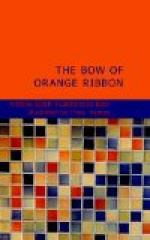“To London I will not go,” she decided. “There is some wicked plan for me. The will and the papers are wanted, that they may be altered to suit it. I will stay here with my child. Even sorrow great as mine is best borne in one’s own home.”
She went to the escritoire to get the papers. When she opened the senseless chamber of wood, she found herself in the presence of many a torturing, tender memory. In one compartment there were a number of trout-flies. She remembered the day her husband had made them—a long, rainy, happy day during his last visit. Every time she passed him, he drew her face down to kiss it. And she could hear little Joris talking about the work, and his father’s gay laughter at the child’s remarks. In an open slide, there was a rude picture of a horse. It was the boy’s first attempt to draw Mephisto, and it had been carefully put away. The place was full of such appeals. Katherine rarely wept; but, standing before these mementos, her eyes filled, and with a sob she clasped her hands across them, as if the sight of such tokens from a happy past was intolerable.
Drawer B was a large compartment full of papers and of Hyde’s personal treasures. Among them was a ring that his father had given him, his mother’s last letter, a lock of his son’s hair, her own first letter—the shy, anxious note that she wrote to Mrs. Gordon. She looked sadly at these things, and thought how valueless all had become to him at that hour. Then she began to arrange the papers according to their size, and a small sealed parcel slipped from among them. She lifted it, and saw a rhyme in her husband’s writing on the outside,—
“Oh, my love, my love! This thy gift I hold More than fame or treasure, more than life or gold.”
It had evidently been sealed within a few months, for it was in a kind of bluish-tinted paper which Hyde bought in Lynn one day during the past winter. She turned it over and over in her hand, and the temptation to see the love-token inside became greater every moment. This was a thing her husband had never designed any human eye but his own to see. Whatever revelation there was in it, much or little, would be true. Tortured by doubt and despair, she felt that impulse to rely on chance for a decision which all have experienced in matters of grave moment, apparently beyond natural elucidation.
“If in this parcel there is some love-pledge from Lady Suffolk, then I go not; nothing shall make me go. If in it there is no word of her, no message to her or from her; if her name is not there, nor the letters of her name,—then I will go to my own. A new love, one not a year old, I can put aside. I will forgive every one but my Lady Suffolk.”




